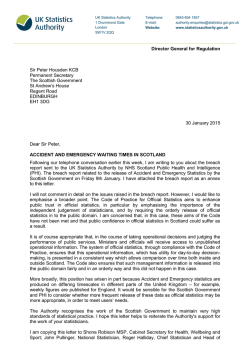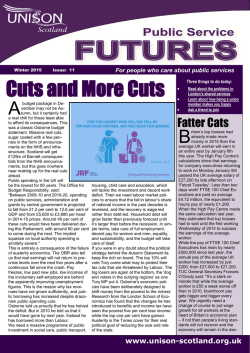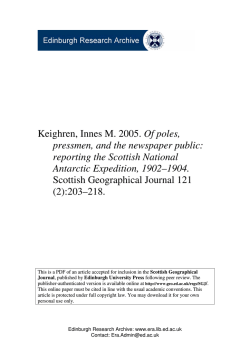
Standard Note - Parliament UK
Draft Scotland Clauses: summary Standard Note: SN/PC/07090 Last updated: 28 January 2015 Editor: Paul Bowers Section Parliament and Constitution Centre This note provides a quick reference guide to the Draft Scotland Clauses 2015, published by the Government in Command Paper 8990, Scotland in the United Kingdom: An enduring settlement, in January 2015. The Library plans to publish a more detailed and analytical account in a few weeks. There are separate notes that explore some aspects of the debate in greater detail, including but not restricted to the Draft Clauses. Tax is covered in Standard Note 7077, Devolution of financial powers to the Scottish Parliament. Votes for 16 year olds is covered in Standard Note 1747, Voting age. Transport is covered in Standard Note 3192, Transport: Scotland. You can follow the narrative of devolution proposals since shortly before the Scottish independence referendum, including the Vow and the Smith Commission, in Standard Note 6987, Scotland: Devolution proposals. A number of authors contributed to this note and may be contacted for further information in their subject areas: they are footnoted throughout the text. This information is provided to Members of Parliament in support of their parliamentary duties and is not intended to address the specific circumstances of any particular individual. It should not be relied upon as being up to date; the law or policies may have changed since it was last updated; and it should not be relied upon as legal or professional advice or as a substitute for it. A suitably qualified professional should be consulted if specific advice or information is required. This information is provided subject to our general terms and conditions which are available online or may be provided on request in hard copy. Authors are available to discuss the content of this briefing with Members and their staff, but not with the general public. Contents 1 Introduction 2 2 Constitutional arrangements 3 2.1 Parliament and Government 3 2.2 Elections 3 3 Tax 4 4 Fiscal framework 5 4.1 Funding from central government 5 4.2 Borrowing 6 5 6 7 1 Welfare 6 5.1 Universal Credit 6 5.2 Benefits to be devolved, power to create new benefits and discretionary payments 7 5.3 Employment support 8 5.4 Funding for welfare 9 Energy 9 6.1 Onshore Oil and Gas Extraction 9 6.2 Energy Efficiency and Fuel Poverty 10 6.3 Renewable electricity schemes: consultation 10 Other subjects 10 7.1 Crown Estate 10 7.2 Equal opportunities 10 7.3 Tribunals 10 7.4 Transport 11 7.5 Consumer advocacy and advice 11 7.6 Gambling – fixed odds betting terminals 11 7.7 Broadcasting 12 7.8 Competition authorities 12 Introduction Before the Scottish independence referendum in September 2014 the three main Unionist parties made a commitment to further devolution to Scotland if there was a No vote. 2 After the referendum, which did deliver a No, Prime Minister David Cameron set up a Commission under Lord Smith of Kelvin, to reach an agreement among all the parties in the Scottish Parliament. This reported its Agreement on 27 November 2014. Part of the commitment made before the referendum was to publish draft legislation by 25 January 2015. The Command Paper and Draft Clauses are intended to satisfy this aim. The Draft Clauses are not the only way that the package of further devolution will be delivered: some will be done by other means, for instance, orders under the Scotland Act 1998 or non-legislative means. This note provides a brief account of the Draft Clauses. We have grouped them as Constitution, Tax, Fiscal framework, Welfare, Energy and other subjects. 2 Constitutional arrangements 1 Part 1 of the Draft Clauses (clauses 1-9) relates to the Smith Commission Agreement’s pillar 1, “providing a durable but responsive constitutional settlement for the governance of Scotland.” 2.1 Parliament and Government The Draft Clauses: provide that a Scottish Parliament and a Scottish Government are recognised as permanent parts of the UK’s constitutional arrangements (clause 1) enshrine the Sewel convention in statute (clause 2) so that the undertaking not normally to legislate on devolved matters without the consent of the Scottish Parliament is added to the Scotland Act 1998 (it is a political undertaking at present) devolve powers over the operation of the Scottish Parliament and Scottish Government, including determining the number of MSPs and rules on their disqualification (clause 3). However, the Scottish Parliament will require a “supermajority” of two-thirds to effect some of these changes (clause 4). 2.2 Elections Clauses 5 – 9 devolve the conduct of Scottish Parliament elections to the Scottish Government and Parliament. Conduct of local elections is already devolved. There will be a requirement, under clause 4, for certain electoral measures to be passed by a “supermajority” of two-thirds of the Scottish Parliament. These include amendments to the franchise, the electoral system and the number of MSPs. Devolved powers for electoral administration in clause 5 will cover: 1 the voting system timing of elections (subject to Scottish Parliament elections not being on the same day as UK general elections, or European Parliament or local elections) eligibility of candidates and the nominations process Paul Bowers, Richard Kelly and Isobel White (elections) 3 methods of voting electoral offences election finance Clause 6 devolves the franchise. The Scottish Parliament will gain the power to extend the franchise to 16 and 17 year olds in time for Scottish Parliament elections in 2016, and for local government elections in 2017, by means of an Order under section 30 of the Scotland Act 1998. Arrangements for this transfer of power are already under way. Clause 7 devolves the regulation of campaign expenditure and controlled expenditure in relation to Scottish Parliament elections. Clause 9 devolves legislative competence in relation to the functions of the Boundary Commission for Scotland for Scottish Parliament boundaries. 3 Tax2 Clauses 10-12 relate to the Smith Commission Agreement’s recommendations on income tax. The Scottish Parliament would have the power to introduce new rates and bands of income tax above the UK personal allowance. This would apply to the same categories of income as the Scottish Rate of Income Tax, as established by the Scotland Act 2012: broadly speaking, income from employment, profits from self-employment, pensions, taxable social security benefits and income from property. Similarly, liability to pay would be based on the statutory test for Scottish taxpayers provided by the 2012 Act.3 Capital gains tax (CGT) is to remain reserved. At present liability to pay the basic or higher rates of CGT is based on an individual’s marginal income tax rate: someone paying income tax at the higher or additional rate is liable to pay the higher rate of CGT on their gains. Clause 12 would ensure that the rate of CGT paid by Scottish taxpayers will continue to be calculated by reference to the UK income tax rate limits. Clauses 13-15 relate to the Agreement’s recommendations regarding the assignment of VAT revenues to the Scottish Government, and to the devolution of both air passenger duty and aggregates levy. Under clause 13 a share of the receipts from VAT attributable to Scotland would be assigned to the Scottish Government’s budget: this would be equivalent to the first 10 percentage points of the revenue from the standard rate of VAT (currently 20%), and the first 2.5 percentage points of the revenue from the reduced rate (currently 5%). In his statement to the House, the Minister, David Mundell, noted that the Commission had recommended the first of these measures, “and the Government feel that it is entirely consistent to apply the same recommendation to the lower rate—the 5% rate—of VAT. That will ensure that 2 3 Antony Seely For more background to the provisions of the 2012 Act in relation to the Scottish rate of income tax see Devolution of tax powers to the Scottish Parliament: the Scotland Act 2012, Library standard note SN5984, 22 January 2015. 4 Scotland receives 50% of the revenue raised.”4 The amounts of VAT attributable to Scotland are to be the subject of an agreement between the Treasury and the Scottish Government. Clause 14 would allow the Scottish Government to charge a tax on air passengers departing from Scottish airports. Similarly clause 15 would allow the Scottish Government to charge a tax on the commercial exploitation of aggregate. In both cases the draft clauses would allow HM Treasury to ‘switch off’ these UK taxes in Scotland from a date to be set by secondary legislation. 4 Fiscal framework5 The fiscal framework is defined by four elements: fiscal rules, fiscal institutions, funding from central government, and tools to manage volatility. A new framework, recognising the additional tax and spending powers of the Scottish Government, will be agreed alongside the introduction of legislation in the next Parliament. The framework will be agreed jointly by the Governments through the Joint Exchequer Committee. The Command Paper offers further detail on the principles of the new fiscal framework.6 Below is a discussion of the key areas. The framework is not embodied in the Draft Clauses themselves; it will be delivered through non-legislative means. 4.1 Funding from central government As devolved taxes will not be sufficient to fund the entire Scottish budget, the Scottish Government will continue to receive a block grant from the UK Government. An appropriate adjustment will be made to the block grant for each tax or spending area that is devolved. The Barnett formula7 will continue to determine annual changes in the block grant. Adjusting the block grant Block grant adjustments should ensure that the Scottish budget faces the full cost or benefits of policy decisions that change revenues or expenditure. Adjustments will also aim to fulfil one of two principles of ‘no detriment’ to the Scottish and UK Government’s budgets: ‘no detriment as a result of the decision to devolve further power’. The Scottish and UK Government’s budgets should be unchanged as a result of the initial transfer of tax, so an adjustment will be made to the block grant which will grow in line with a chosen index. Options exist for indexation, but the Command Paper specifically discusses the approach to be adopted for the Scottish Rate of Income Tax: indexing against growth in the UK income tax base. A block grant adjustment will also be made to ensure that the overall level of spending in Scotland and the rest of the UK is unchanged following spending devolution. Impact of post-devolution policy decisions The second ‘no detriment’ principle is that there should be: 4 HC Deb 22 January 2015 c383 Matt Keep 6 Discussion of the Smith Commission’s fiscal framework recommendations is available in the Library note Devolution of financial powers to the Scottish Parliament: recent developments. 7 See Commons Library Research Paper, The Barnett Formula, 14 December 2007 5 5 ‘no detriment as a result of UK Government or Scottish Government policy decisions post-devolution’. If policy decisions taken by one government impact on the other, the decision-making government will either reimburse the other, in the case of an additional cost, or receive a transfer from the other if there is a saving. The Command Paper breaks this principle down to cover budgets and taxpayer fairness. In relation to taxpayer fairness, changes in taxes that apply only in the rest of the UK should affect spending only in the rest of the UK. Likewise, changes in taxes that apply only in Scotland should affect spending only in Scotland. The former outcome is more difficult to deliver, given the interaction between tax revenues and the Barnett formula. In relation to budgets, “if decisions by one government affect the tax/spending of the other then the decision making government will meet the cost (or retain the saving). There will need to be a shared understanding of the principle in order to deliver a workable outcome.”8 Both direct and behavioural effects of policy changes will need to be considered when making this assessment. 4.2 Borrowing The Smith Commission recommended additional borrowing powers be made available to the Scottish Government for current expenditure, to manage additional fiscal risks, and for capital expenditure, to support capital investment. The Command Paper is clear that the extent of borrowing powers provided to manage current expenditure will relate to the risks the Scottish budget faces from its funding arrangements, and that “a set of fiscal rules and robust institutional arrangements will need to be in place to ensure that the overall UK public finances remain sustainable.”9 5 Welfare10 Welfare is covered in clauses 16-22 of the Draft Clauses, with a discussion in Chapter 4 of the Command Paper.11 5.1 Universal Credit Clause 20 would give regulation making powers to Scottish Ministers to determine when payments of the housing element may be made to landlords. Scottish Ministers would also gain regulation making powers to vary the calculation of housing costs covered by Universal Credit. It is this clause that would enable the variation or abolition of the under-occupation deduction for social rented tenants of working-age in Scotland (“bedroom tax”/”spare room subsidy”). Other possible variations could apply to the level and definition of non-dependant deductions;12 the rates of Local Housing Allowance (LHA);13 and the level of rent 8 HM Government. Scotland in the UK: An enduring settlement, January 2015, para 2.4.16 Scotland in the UK: An enduring settlement, para 2.4.28 10 Steven Kennedy, Wendy Wilson and Aliyah Dar 11 Cm 8990, 22 January 2015 9 6 charged by social landlords to be taken into account in calculating assistance with housing costs.14 The housing element will however remain an integral part of UC and there are no proposals to allow amendments to the taper (the rate at which benefit is withdrawn as income rises). Clause 21 gives Scottish Ministers regulation making powers for alternative payment arrangements for Universal Credit in Scotland, enabling for example more frequent payments, or split payments between members of a couple. Before exercising the regulation-making powers under clause 20 or clause 21, Scottish Ministers must first consult with the Secretary of State “about the practicability of implementing the regulations.” The purpose of this, according to the Command Paper, is to “ensure the deliverability of any changes that the Scottish Government wish to take forward.”15 The date for implementing any change also needs to be agreed “to ensure that a timescale for delivering changes … can be discussed and agreed as part of DWP’s overall delivery plan.16 The clauses provide that the Secretary of State’s consent will not be “unreasonably withheld.” 5.2 12 13 14 15 16 17 18 19 Benefits to be devolved, power to create new benefits and discretionary payments Clauses 16, 17 and 19 give the Scottish Parliament legislative competence for selected disability and carer benefits, payments which currently comprise the regulated Social Fund and Discretionary Housing Payments respectively. Clause 16 confirms that the disability benefits to be devolved include Industrial Injuries Disablement Benefit (IIDB) and Severe Disablement Allowance (SDA). The rationale for devolving the latter benefit is unclear since SDA has been closed to new claims since 2001 and the remaining working-age SDA claimants have been, or are being, reassessed for Employment and Support Allowance.17 The Command Paper confirms that current welfare reforms, including the introduction of Personal Independence Payment (PIP),18 will not be postponed pending further devolution of powers.19 The Smith Commission’s report did not address this issue, but Citizens Advice Scotland says it is “disappointed and bewildered” by the announcement that migration of DLA claimants to PIP will not be postponed. It is A non-dependant is someone who normally lives with the Housing Benefit claimant such as an adult son, daughter, relative or friend. A deduction from Housing Benefit is made depending on the income of the nondependent irrespective of whether the non-dependent pays this sum to the benefit claimant or not. Exemptions apply in certain cases. LHA is payable to private sector tenants – since April 2011 LHA rates have been based on the 30 th percentile of local market rents (previously the median) within a Broad Market Rental Area. Scottish Ministers will be able to deem social rent levels to be “excessive” in certain circumstances. In England and Wales rent rebate subsidy limitation was introduced to give authorities an incentive to control the level of rent increases. Where an authority increases its average weekly rent above a limit set in England by the Secretary of State and in Wales by the Welsh Assembly Government (WAG), it only receives subsidy on rebates (Housing Benefit) up to the limit and has to fund the cost of additional rebates above the limit rent through the rents of tenants not in receipt of rebates. Scotland in the United Kingdom: An enduring settlement, Cm 8990, January 2015, para 4.2.8 Ibid. See Library briefing SN06855, Incapacity benefit reassessments See Library briefing SN06861, Introduction of Personal Independence Payment Scotland in the United Kingdom: An enduring settlement, para 4.3.2 7 concerned that the real reason is “to reduce the benefit pot before it is transferred to the Scottish Parliament.”20 The Smith Commission’s report stated that the Scottish Parliament would have powers to create new benefits “in areas of devolved responsibility.”21 This was interpreted by some as meaning that new benefits could be created in any devolved area, for example housing or education. The Command Paper states however that the power to create new benefits applies only to “devolved areas of welfare responsibility.”22 The specific descriptions of the benefits to be devolved may also limit the scope for variation. The Smith Commission stated that that Scottish Parliament would have “new powers to make discretionary payments in any area of welfare.”23 This was interpreted by many as a general power to “top up” existing UK benefits. However, clause 18 provides that any such payments must be for “a short-term need that requires to be met to avoid a risk to the well-being of the individual.” The Command Paper confirms that any new benefits or discretionary payments introduced “must provide additional income for a recipient and not result in an automatic offsetting reduction in their entitlement to other benefits or post-tax earnings if in employment.”24 This is not covered in the draft clauses, but the UK Government would consider any new benefits or discretionary payments “on an individual basis” to ensure there is no offsetting. Any additional benefit payments provided by the Scottish Government are to be disregarded for the purposes of the Household Benefit Cap. This is not covered in the draft clauses and the Command Paper states that no legislation is required. It states that any additional amount of devolved benefit included within the cap would be disregarded, and that “only the amount of the payment equivalent to that provided by the UK Government would be subject to the cap.”25 It is not entirely clear how this would work, eg where a devolved benefit which is subject to the cap is replaced by a new benefit in Scotland which has different eligibility criteria. 5.3 Employment support 20 21 22 23 24 25 Draft clause 22 would give the Scottish Parliament the legislative competence required to pass laws to design and implement employment schemes for unemployed people and to help disabled people into work. The powers would be transferred on the expiry of the current DWP commercial contracts in 2017. Separate Scottish schemes would have to be coordinated with the UK wide system of employment support (which will remain reserved). Citizens Advice Scotland, CAS "disappointed and bewildered" by UK Government response to Smith, 22 January 2015 Report of the Smith Commission for further devolution of powers to the Scottish Parliament, 27 November 2014, para 54 Scotland in the United Kingdom: An enduring settlement, para 4.1.5 Report of the Smith Commission for further devolution of powers to the Scottish Parliament, 27 November 2014, Ibid. para 4.3.12 Ibid. para 4.3.13 8 5.4 6 Funding for welfare The Command Paper gives some additional clarity on the funding arrangements for devolved welfare.26 For expenditure to be devolved which currently falls within Departmental Expenditure Limits (DEL), the block grant in year one would be increased by the amount of spending on that benefit/service in Scotland at that point (plus an amount for associated administration costs). For subsequent years, changes in funding will be determined through the Barnett Formula. For spending outside DEL (the majority of benefits spending), there would again be an adjustment to the block grant in year one equivalent to the existing level of spending, but the Command Paper states that “the UK and Scottish Governments will need to work together to determine how this funding changes in subsequent years to dynamically and mechanically reflect changes in the welfare spending that would have been undertaken by the UK Government over time.”27 The Smith Commission merely stated that the amount would need to be “indexed appropriately.” As proposed by the Smith Commission, financial relations between the Scottish Government and the UK Government are to be based on a “no detriment principle.” If decisions by one government affect the tax/spending of the other then the decisionmaking government will meet the cost (or retain the saving).28 Examples could include where an increase in income tax in Scotland leads to higher spending on Universal Credit, where changes to devolved benefits impact on spending on “passported benefits” which are reserved, or decisions regarding employment programmes influence how quickly people move into work (with resulting implications for the UK benefit bill). It has been suggested that a mechanism to provide compensation in such situations could be “hideously complicated” and a potential source of disagreement between the administrations.29 Energy Responsibility for energy policy in Great Britain is mostly reserved to Westminster, but a number of matters relating to energy are already devolved to Scotland. Scotland, England and Wales have a single energy market where supply and demand is managed jointly for the whole of Great Britain. Extracting mineral energy resources and exploiting renewable energy is licenced by DECC. Environmental and planning regulation relating to energy generation and resources is devolved to Scotland, as are some matters relating to energy efficiency. 6.1 Onshore Oil and Gas Extraction All fossil fuels are owned by the UK and licences to extract these resources are managed by DECC. Clause 31 would devolve the process of managing licences to exploit oil and gas resources onshore (ie not under the sea bed) to the Scottish Government. This would include powers on licensing fracking operations to extract shale gas. 26 27 28 29 Ibid. Chapter 2 Ibid. para 2.4.10 Ibid. para 2.4.16 See Professor Paul Spicker’s blog of 23 January, The commitment to devolution has been watered down still further, and the subsequent exchange between Professor Spicker and David Phillips of the Institute for Fiscal Studies 9 The clause makes it clear that while administration licences should be matters for the Scottish Parliament, the taxation of oil and gas should remain reserved. Revenue from oil and gas is chiefly acquired by taxation. The Smith Commission Agreement set out that access powers should be devolved to Scotland. The clause also provides the Scottish Government with a competence to legislate for additional rights required when extracting oil and gas. These rights include the access required when drilling beneath another person’s property when fracking for shale gas. The UK Government has, in the meantime, amended the Infrastructure Bill so that the new underground access rights it provides do not apply in Scotland.30 6.2 Energy Efficiency and Fuel Poverty The Warm Home Discount and Energy Company Obligation are examples of Government schemes that provide financial support and funding to install energy efficiency measures for vulnerable customers. They are funded by energy companies who are obliged to participate in the schemes. Clauses 38 and 39 would provide the Scottish Government with powers to design how such ‘supplier obligation’ schemes are implemented in Scotland so that they can better target funding and support. Setting the way the money is raised by these schemes (the scale, costs and apportionment of the obligations as well as the obligated parties) will remain reserved to Westminster. 6.3 Renewable electricity schemes: consultation Clause 40 amends the Scotland Act 1998 to place a duty on the Secretary of State to consult Scottish Ministers when establishing any renewables incentive scheme that would apply in Scotland, or significantly amending any such scheme. This would apply to statutory and non-statutory energy schemes. It would also apply to the following three schemes, except for fossil fuel or nuclear generation: contracts for difference, feed-in tariffs and the renewables obligation. 7 Other subjects 7.1 Crown Estate31 Clause 23 allows the Treasury to devolve to the Scottish Ministers or their nominee all the functions of the Crown Estate Commissioners in Scotland. The transfer scheme must respect employment rights of Crown Estate staff, and the UK interest in reserved matters such as national security, exploitation of oil and gas, and the interests of consumers in consistent management of the Crown Estate across Britain where it relates to electricity transmission. 7.2 Equal opportunities Clause 24 makes changes to the extent to which equalities are reserved. 7.3 Tribunals32 Under clause 25 responsibility for the management and operation of most reserved tribunals would transfer to the Scottish Parliament. In particular, this could lead to changes in the operation of employment, tax and information rights tribunals. However, the laws providing 30 31 32 HC Deb, 26 Jan 2015, col 622 Paul Bowers Alexander Horne for the general subject, individual subject specialists deal with tribunals in their own areas 10 for the underlying substantive rights and duties would continue to remain reserved. Responsibility for certain other tribunals (essentially those responsible for considering matters associated with national security, namely the Special Immigration Appeals Commission, Pathogens Access Appeals Commission, Investigatory Powers Tribunal and the Proscribed Organisations Appeals Commission) would not be transferred. 7.4 Transport33 Clauses 26-30 and 35-37 relate to transport matters. The most noteworthy proposed changes are to rail franchising (clause 37) and road signs and speeds (clauses 26-28). Clause 37 would allow a public sector operator to bid for the Scotrail franchise (a new franchise has just been agreed so this measure is not likely to be relevant for at least 5 years). This will not be permitted in England and Wales (Labour has indicated it would extend the power to England and Wales if it forms a Government after 7 May 2015). Clauses 26-28 would allow the Scottish Government to set speed limits in Scotland and to make its own road signs, which could lead to differences with England. This would require motorists crossing the border to ensure they were aware of any such differences, much like those who currently travel through the Channel Tunnel to drive in France. The Bill also devolves the functions of the British Transport Police. It gives the Scottish Government a formal consultative role on the Maritime and Coastguard Agency and the Northern Lighthouse Board, with respect to their activities in Scotland, and it provides for their activities to be scrutinised by select committees of the Scottish Parliament. 7.5 Consumer advocacy and advice34 Clause 32 would provide the Scottish Parliament with competence to make provision for Scotland in relation to consumer advocacy and advice (but not consumer protection, which would remain reserved). This would include powers to investigate complaints of general relevance, to pursue complaints for vulnerable consumers, and to assist those facing disconnection, for example from their electricity supply (governed by the Consumers, Estate Agents and Redress Act 2007). In effect, the Scottish Parliament would be able to create its own Scottish model for the delivery of consumer advocacy and advice, to meet the needs and expectations of a Scottish consumer market. 7.6 Gambling – fixed odds betting terminals35 Clause 33 would amend the Gambling Act 2005 to allow the Scottish Government to vary the number of fixed odds betting terminals (also known as B2 gaming machines) in betting shops. At present up to four machines are allowed. The power would only apply to applications for new licences. 33 34 35 Louise Butcher Lorraine Conway John Woodhouse/Philip Ward 11 7.7 Broadcasting36 Under clause 34 the power to approve appointments by Ofcom, the UK-wide media regulator, to the board of MG Alba, the Gaelic Media Service, would rest solely with Scottish Ministers. Scottish Ministers would also acquire the power to appoint a Scottish member to the Ofcom board. Under clauses 43 and 44 Ofcom would be required to lay its annual report and accounts and any other reports before the Scottish Parliament; in addition, there would be a new obligation on Ofcom to appear before committees of the Scottish Parliament. 7.8 Competition authorities37 In the UK the responsibility for enforcing competition law lies with the independent competition authority, the Competition & Markets Authority (CMA).38 Exceptionally Ministers may require the CMA to carry out an investigation into a market for specific goods or services, and clause 41 would extend this power to Scottish Ministers, if acting jointly with the Secretary of State. 36 37 38 John Woodhouse/Philip Ward Antony Seely For more details see The UK competition regime, Library standard note SN4814, 16 January 2015. 12
© Copyright 2026







